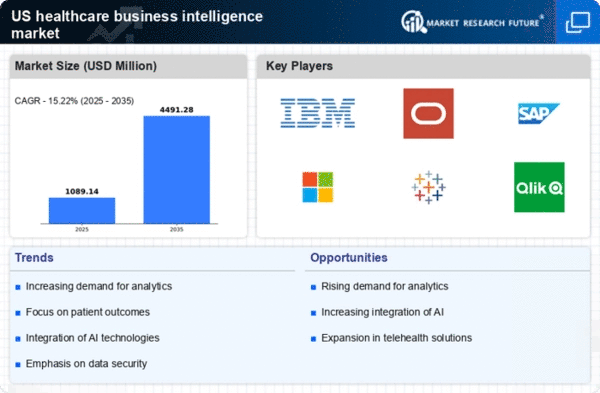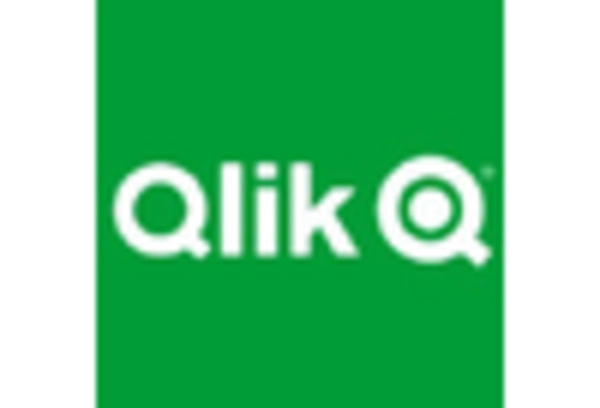Expansion of Telehealth Services
The expansion of telehealth services is significantly influencing the healthcare business-intelligence market. As telehealth becomes more prevalent, healthcare providers are increasingly reliant on data analytics to monitor patient engagement and outcomes remotely. This shift necessitates robust business intelligence solutions that can analyze vast amounts of data generated through telehealth platforms. Recent reports indicate that telehealth usage has surged, with estimates suggesting that it could account for over 30% of all healthcare visits in the near future. Consequently, healthcare organizations are investing in business intelligence tools to track telehealth performance metrics, patient satisfaction, and clinical effectiveness. The ability to analyze this data effectively is crucial for optimizing telehealth services and ensuring high-quality care delivery. As telehealth continues to evolve, the demand for sophisticated analytics within the healthcare business-intelligence market is expected to grow, driving innovation and investment in this sector.
Increased Focus on Patient-Centric Care
The healthcare business-intelligence market is witnessing a shift towards patient-centric care, which is reshaping how healthcare organizations operate. This trend emphasizes the importance of understanding patient needs and preferences, leading to the adoption of analytics tools that can provide insights into patient behavior and outcomes. As healthcare providers strive to enhance patient experiences, they are increasingly utilizing business intelligence solutions to analyze patient data and tailor services accordingly. Reports suggest that organizations focusing on patient engagement can see improvements in satisfaction scores by up to 20%. This focus on patient-centricity not only enhances care quality but also drives operational efficiencies. Consequently, the healthcare business-intelligence market is likely to expand as organizations seek to implement data-driven strategies that prioritize patient needs, ultimately fostering a more responsive and effective healthcare system.
Technological Advancements in Data Analytics
Technological advancements in data analytics are playing a pivotal role in shaping the healthcare business-intelligence market. Innovations such as machine learning, natural language processing, and big data analytics are enabling healthcare organizations to extract valuable insights from complex datasets. These technologies facilitate predictive modeling and trend analysis, which are essential for informed decision-making. Recent studies suggest that the integration of advanced analytics can lead to cost reductions of up to 15% in operational expenses. As healthcare providers increasingly adopt these technologies, the demand for sophisticated business intelligence solutions is expected to rise. Furthermore, the ability to harness real-time data analytics empowers organizations to respond swiftly to emerging challenges and opportunities. Consequently, the healthcare business-intelligence market is likely to experience robust growth as technological advancements continue to enhance the capabilities of data analytics in the sector.
Rising Demand for Data-Driven Decision Making
The healthcare business-intelligence market is experiencing a notable surge in demand for data-driven decision making. Healthcare organizations are increasingly recognizing the value of leveraging data analytics to enhance operational efficiency and improve patient outcomes. According to recent estimates, the market is projected to grow at a CAGR of approximately 12% over the next five years. This growth is driven by the need for actionable insights that can inform clinical and administrative decisions. As healthcare providers seek to optimize resource allocation and reduce costs, the adoption of business intelligence tools becomes essential. Furthermore, the integration of real-time data analytics allows for timely interventions, ultimately leading to better patient care. The emphasis on data-driven strategies is likely to continue shaping the landscape of the healthcare business-intelligence market, as stakeholders strive for improved performance and accountability.
Regulatory Changes and Compliance Requirements
Regulatory changes and compliance requirements are exerting a considerable influence on the healthcare business-intelligence market. As healthcare regulations evolve, organizations must adapt their data management practices to ensure compliance with standards such as HIPAA and other federal mandates. This necessity drives the demand for business intelligence solutions that can facilitate accurate reporting and data governance. Recent analyses indicate that non-compliance can result in penalties exceeding $1 million for healthcare organizations, underscoring the importance of robust compliance strategies. As a result, healthcare providers are increasingly investing in analytics tools that not only streamline compliance processes but also enhance data security and integrity. The ongoing evolution of regulatory frameworks is likely to propel growth in the healthcare business-intelligence market, as organizations seek to mitigate risks and ensure adherence to legal requirements.
















